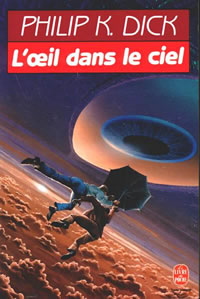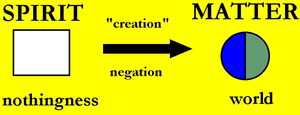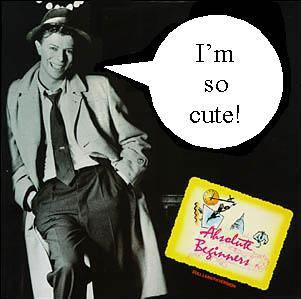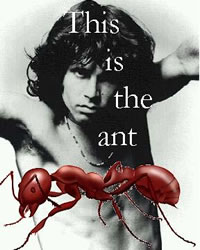1. F. Zappa,
‘Cheepnis’, Roxy & Elsewhere, 1974.
2. Ibid.
3. F. Zappa,
‘Flambay’, Sleep Dirt, 1978.
4. F. Zappa,
‘Beauty Is A Lie’, You Are What You Is, 1981.
5. Th. W.
Adorno, "Vers une musique informelle", in Id., Gesammelte
Schriften (GS), Suhrkamp, Frankfurt a.M. 1997, vol. XVI, p. 502.
6. F. Zappa,
‘Cheepnis’, cit.
7. After that,
cars would probably ‘crash all over the place as a result of poeple with
Hawaiian shirts on lookin’ up to see her face’. F. Zappa, ‘Drowing Witch’,
Ship Arriving To Late To Save A Drowing Witch, 1982. All in all,
reality is far more stupid than its pale cinematic copy.
8. F. Zappa,
‘Shall We Take Ourselves Seriously’, You Can’t Do That on Stage Anymore,
vol. 5, 1992.
9. ‘The attitude
of the public, which ostensibly and actually favors the system of the
culture industry, is a part of the system and not an excuse for it’. Th.
W. Adorno - M. Horkheimer, Dialektik der Aufklärung, in GS,
vol. 3, p. 143.
10. ‘People
are usually aware when the government’s hand goes in their pocket; they’re
not usually aware when the government’s hand reaches for other erogenous
zones on their body, or covers their eyes up’, quoted in M. Gray Mother!
Is The Story Of Frank Zappa, Proteus Book, London/NY 1985, p. 152.
11. Th. W.
Adorno, Negative Dialektik, GS, vol. 6, pp. 148-149.
12. F. Zappa,
‘Uncle Meat Film Excerpt Part I’, Uncle Meat, 1969.
13. Th. W.
Adorno, Minima Moralia, aphorism 74, ‘Mammoth’.
14. Ibid.
15. See M.
Maurizi, ‘Ecce Robot: How To Philosophise with an Atomic Punch’, in Soundscapes
- online journal on media culture, ISSN 1567-7745, volume 5, February
2003.
16. Curiously
enough, the previous title of this song was: ‘One more time for the world’.
17. F. Zappa,
‘Spider of Destiny’, Sleep Dirt, 1979.
18. By the
same token, it’s the desire to destroy that manages to find its enemy,
according to Adorno’s and Horkheimer’s interpretation of anti-Semitism.
See Th. W. Adorno - M. Horkheimer, Dialektik der Aufklärung,
cit., pp. 192-234.
19. F. Zappa,
‘Nanook Rubs It’, Apotrophe ( ‘ ), 1974.
20. M. Gray,
cit., p. 24.
21.
W. Blake, The Book Of Urizen, in Poesie, Newton & Compton,
Roma 1991, p. Blake’s vision steams with ‘sulphurous foams’ and vile liquids,
getting very near to Zappa’s imaginary. He also calls ‘woof’ that ‘infinite
labour’ wove round the Void: i.e. ‘science’. The role of apostrophe and
zero as images of ‘omission’ and ‘absence’ is brilliantly explained in
B. Watson, Frank Zappa’s The Negative Dialectic of Poodle Play,
St. Martin’s Griffin, NY 1993, cit., pp. 253-259. For another interesting
use of nullity see Lydon’s ‘nothing, a void, zilch, zero, nought, nothing,
vacuum’. PIL, ‘Fodderstompf’, Public Image Limited - First Issue,
1979.
22. See B.
Watson, Poodle Play, pp. 261-271 and B. Watson, ‘Phänomenologie
des One Size Fits All: Georg Wilhelm Friedrich Hegel und Frank
Zappa’, a paper delivered at Zappanale #14, Kamptheater, Bad Doberan,
25 Juli 2003.
23. Th. W.
Adorno, Stichworte, GS, vol. 10/2, p. 603
24. G. W.
F. Hegel, Science of Logic, §§ 132-133
25. K. Marx,
Economic and Philosophical Manuscripts of 1844, ‘Private Property
and Communism’, 5
26. Th. W.
Adorno, Negative Dialektik, cit., p. 139.
27. K. Marx,
The Poverty of Philosophy, ‘The Metaphysics of Political Economy’,
I observation.
28. Ibid.
29. Aristotle,
Metaphysics, Λ7, 1072 b 18 - b 30 which Hegel puts as a conclusion
of his Encyclopaedia Of Philosophical Sciences, §577.
30. F. Zappa,
‘Cosmik Debris’ Apostrophe ( ’ ), 1974.
31. F. Zappa,
‘Yo Mama’, Sheik Yerbouti, 1979. ‘Pojama People’ and ‘Muffin Man’
are other good examples of imbecile inanity.
32. W. Blake,
‘The Human Abstract’, in Poesie, cit., p. 82.
33. F. Zappa,
‘A Token Of My Extreme’, Joe’s Garage, 1979.
34. G. Mahler,
Symphony n. 1 in D Major ‘Titan’, Dover, New York 1998, p. 1.
35. F. Zappa,
‘I Come From Nowhere’, Ship Arrving To Late To Save A Drowning Witch.,
1982.
Back
to ICE-Z
Get You Back Home

One should also remember the monster movies fashion, celebrated with an explicit song in the Roxy & Elsewhere album: ‘Cheepnis’. In his introduction to the song Zappa explains: ‘Cheepnis in the case of a monster movie has nothing to do with the budget of the film, although it helps, but true cheepnis is exemplified by visible nylon strings attached to the jaw of a giant spider’.(1) The importance of these lines can hardly be overestimated. The song itself is a tribute to the cheap aroma of B-movies: "Can y'all see now?/The little strings on the Giant Spider?/The Zipper From The Black Lagoon?" (2) It is as Zappa was only interested in the active role of movie-goers that can spot technical mistakes and make fun of them. Zappa goes so far to declare that "that’s all he really wants to know" about those films. He is attracted by their innocent fraudulence, the way technical limitations have an estranging, Brechtian effect on the audience. The zipper from the Black Lagoon produces an undesired crash in the crystalline sphere of aesthetic representation, making it suddenly collapse. The Sleep Dirt album included songs from the sci-fi musical Hunchentoot, apparently a sort of mutant blending between Ruben’s attack on love song stupidity and Zappa’s weakness for Cheepnis. In ‘Flambay’, which develops Uncle Meat’s love affair between the girl and the monster (although the female character here ends up manipulating the monster), we read the lines

 This
is precisely an account of what usually happens in the ‘making’ of a monster
movie, save that the low-budget of a monster movie, makes it difficult
to tell the difference between the ‘making’ and the final result. As a
matter of fact, those lines are a faithful account of what one would normally
say if he/she was ever going to meet a 15 feet tall Witch on the freeway.(7)
Characters in monster movies usually don’t say stuff like that, because
that would pathetically reveal the trick and spoil the cheap thrill of
the audience. Yet, is precisely this nice interplay between fiction and
reality, that excites Zappa’s phantasy. Of course, those are not
‘real’ trees and you can tell the monster has just put its mask on before
shooting the presumably ‘scary’ scene. That only goes to show you that
low-budget productions are asking you to give them a chance to
be taken seriously. You have to participate in order to make them
real, otherwise you’ve got just ‘an inverted ice-cream cone’. Looking
at the whole culture industry from this perspective, you can see through
its gears. Isn’t it just the same for ‘cool’ productions, too? Isn’t this
the emotional structure of ‘standardisation’ and mechanical reproducibility?
By bringing up ‘the Spargel for discussion’(8), Cheepnis
unmasks the libidinal investment employed by culture industry to give
its goods the aura of reality. If audience’s libido is itself part of
the culture industry - as Adorno & Horkheimer recognised in The
Dialectic of Enlightenment (9) - Cheepnis opens a vulgar crack
in the circularity of production and consumption. Realising how capitalism
administrates desire, Zappa learned his lesson from Cheepnis. Though basically
mass-deception, culture industry is a belle dame sans merci and
Zappa found his own way to cause her some dismay. In so doing, Zappa’s
music resembles Adorno’s gloomy realism on mass manipulation, a necessary
step to find appropriate weapons to beat capitalism, not a sad way to
give up the fight because it’s all over now, baby blur. Zappa’s entire
oeuvre is an attempt to make the listener conscious of his own libidinal
involvement in the productive machinery.(10)
This
is precisely an account of what usually happens in the ‘making’ of a monster
movie, save that the low-budget of a monster movie, makes it difficult
to tell the difference between the ‘making’ and the final result. As a
matter of fact, those lines are a faithful account of what one would normally
say if he/she was ever going to meet a 15 feet tall Witch on the freeway.(7)
Characters in monster movies usually don’t say stuff like that, because
that would pathetically reveal the trick and spoil the cheap thrill of
the audience. Yet, is precisely this nice interplay between fiction and
reality, that excites Zappa’s phantasy. Of course, those are not
‘real’ trees and you can tell the monster has just put its mask on before
shooting the presumably ‘scary’ scene. That only goes to show you that
low-budget productions are asking you to give them a chance to
be taken seriously. You have to participate in order to make them
real, otherwise you’ve got just ‘an inverted ice-cream cone’. Looking
at the whole culture industry from this perspective, you can see through
its gears. Isn’t it just the same for ‘cool’ productions, too? Isn’t this
the emotional structure of ‘standardisation’ and mechanical reproducibility?
By bringing up ‘the Spargel for discussion’(8), Cheepnis
unmasks the libidinal investment employed by culture industry to give
its goods the aura of reality. If audience’s libido is itself part of
the culture industry - as Adorno & Horkheimer recognised in The
Dialectic of Enlightenment (9) - Cheepnis opens a vulgar crack
in the circularity of production and consumption. Realising how capitalism
administrates desire, Zappa learned his lesson from Cheepnis. Though basically
mass-deception, culture industry is a belle dame sans merci and
Zappa found his own way to cause her some dismay. In so doing, Zappa’s
music resembles Adorno’s gloomy realism on mass manipulation, a necessary
step to find appropriate weapons to beat capitalism, not a sad way to
give up the fight because it’s all over now, baby blur. Zappa’s entire
oeuvre is an attempt to make the listener conscious of his own libidinal
involvement in the productive machinery.(10)  Anyway,
it’s not what Zappa thinks or says about this that is interesting, rather
the way his art entertains our id and produces activity from the part
of the listener. If beauty is the trademark of oppression and order, deformity
is the esthetical precognition of revolution as shown by the Latin word
monstrum, which originally meant ‘wonder’, no less than
‘horrible shape’. Monstrosity under capitalism is a logic of disgregation
(Logik des Zerfalls(11)) and way of naming the ‘new’, something
both critical thought and action can’t do without. That’s why revolution
can find appropriate expression only in the open shape of monstrosity
(i.e. a polemical overturn of manipulation), rather than depressive paranoia.
Thus, the critical thinker who doesn’t want to know about the monster
inside his own soul, is not only deluding himself, but also castrating
his hidden wonders. From his part, Zappa cunningly describes the sad impotence
of the critical theorist unable to take part of the event criticised.
In Uncle Meat Don Preston is worried about Phyllis’ weird love
for the monster and works out some cheap psychoanalytical explanation,
looking for some trauma in her childhood: ‘It must be uh, her mother and
father probably told her that she's real ugly and awkward and dumb and
everything...And so she relates to people that are ugly, dumb and awkward’.
After that, Don is driven to sociological conclusions: ‘Don: And our young
society today goes to all these monster movies and they see them on television
night after night. (Phyllis: It's so terrific to be with the monster)
Don: We're raising a new generation of monster lovers’.(12) As
a matter of fact, real sociological explanations of this phenomenon
had been finely and cynically proposed by Adorno years before. As he pointed
out in Minima Moralia, giant creatures are ‘collective projections
of the monstrous total State. People prepare themselves for its terrors
by familiarising themselves with gigantic images. In its absurd readiness
to accept these, impotently prostrate humanity tries desperately to assimilate
to experience what defies all experience’.(13) The desire
to see those prehistoric creatures in action once again, reveals the secret
hope ‘that animal creation may survive the injustice Man has perpetrated
on it and produce a better species who could finally make it’.(14)
Adorno’s insights get very near to those of the Japanese artist Go Nagai
- who was also inspired by 50s science-fiction. In his stories, Planet
Earth is attacked by monsters that embody the revolt of repressed nature
against culture.(15) Also alluding to our chemical origin, ‘The
Ocean Is The Ultimate Solution’(16) similarly presents the extermination
of human race as negative image of redemption on the Earth, while the
connection between fear of Otherness and hidden desire of self-destruction
is immortalised in the aftermath of ‘Spider of Destiny’:
Anyway,
it’s not what Zappa thinks or says about this that is interesting, rather
the way his art entertains our id and produces activity from the part
of the listener. If beauty is the trademark of oppression and order, deformity
is the esthetical precognition of revolution as shown by the Latin word
monstrum, which originally meant ‘wonder’, no less than
‘horrible shape’. Monstrosity under capitalism is a logic of disgregation
(Logik des Zerfalls(11)) and way of naming the ‘new’, something
both critical thought and action can’t do without. That’s why revolution
can find appropriate expression only in the open shape of monstrosity
(i.e. a polemical overturn of manipulation), rather than depressive paranoia.
Thus, the critical thinker who doesn’t want to know about the monster
inside his own soul, is not only deluding himself, but also castrating
his hidden wonders. From his part, Zappa cunningly describes the sad impotence
of the critical theorist unable to take part of the event criticised.
In Uncle Meat Don Preston is worried about Phyllis’ weird love
for the monster and works out some cheap psychoanalytical explanation,
looking for some trauma in her childhood: ‘It must be uh, her mother and
father probably told her that she's real ugly and awkward and dumb and
everything...And so she relates to people that are ugly, dumb and awkward’.
After that, Don is driven to sociological conclusions: ‘Don: And our young
society today goes to all these monster movies and they see them on television
night after night. (Phyllis: It's so terrific to be with the monster)
Don: We're raising a new generation of monster lovers’.(12) As
a matter of fact, real sociological explanations of this phenomenon
had been finely and cynically proposed by Adorno years before. As he pointed
out in Minima Moralia, giant creatures are ‘collective projections
of the monstrous total State. People prepare themselves for its terrors
by familiarising themselves with gigantic images. In its absurd readiness
to accept these, impotently prostrate humanity tries desperately to assimilate
to experience what defies all experience’.(13) The desire
to see those prehistoric creatures in action once again, reveals the secret
hope ‘that animal creation may survive the injustice Man has perpetrated
on it and produce a better species who could finally make it’.(14)
Adorno’s insights get very near to those of the Japanese artist Go Nagai
- who was also inspired by 50s science-fiction. In his stories, Planet
Earth is attacked by monsters that embody the revolt of repressed nature
against culture.(15) Also alluding to our chemical origin, ‘The
Ocean Is The Ultimate Solution’(16) similarly presents the extermination
of human race as negative image of redemption on the Earth, while the
connection between fear of Otherness and hidden desire of self-destruction
is immortalised in the aftermath of ‘Spider of Destiny’:  In Philip K.
Dick’s Eye In The Sky, God is figured as a giant eye at the core
of a Heliocentric Solar System, according to a vision produced by the
distorted Mind of a religious fanatic. In a more funny way, Zappa’s speculation
on God’s sofa performs a critique of idealism, assuming that the religious
inversion of Matter and Spirit, i.e. the idea that Matter is itself a
product of spiritual activity, is an ontological perversion of truth.
Putting a sofa - a manufactured object, the very symbol of middle-class
intimacy - in the midst of a primordial nowhere is a cunning reminder
of the actual thinker behind every metaphysical speculation. Far from
being an innate, natural idea, this nothingness is manufactured by human
mind - no less than the sofa; it’s nothing but the persistent, active
negation of the sensuous world. Although Zen Buddhism may have led Zappa
out of Catholicism(20), he was aware that repressive ‘emptiness’
is something religion can’t do without, even if it doesn’t force you to
believe in ex nihilo creation. As already pointed out by William
Blake in his prophetic work Urizen, this primordial emptiness is
‘unknown, unprolific, self-clos’d, all-repelling: what Demon hath form’d
this abominable void, this soul-shudd’ring vacuum?’.(21)
In Philip K.
Dick’s Eye In The Sky, God is figured as a giant eye at the core
of a Heliocentric Solar System, according to a vision produced by the
distorted Mind of a religious fanatic. In a more funny way, Zappa’s speculation
on God’s sofa performs a critique of idealism, assuming that the religious
inversion of Matter and Spirit, i.e. the idea that Matter is itself a
product of spiritual activity, is an ontological perversion of truth.
Putting a sofa - a manufactured object, the very symbol of middle-class
intimacy - in the midst of a primordial nowhere is a cunning reminder
of the actual thinker behind every metaphysical speculation. Far from
being an innate, natural idea, this nothingness is manufactured by human
mind - no less than the sofa; it’s nothing but the persistent, active
negation of the sensuous world. Although Zen Buddhism may have led Zappa
out of Catholicism(20), he was aware that repressive ‘emptiness’
is something religion can’t do without, even if it doesn’t force you to
believe in ex nihilo creation. As already pointed out by William
Blake in his prophetic work Urizen, this primordial emptiness is
‘unknown, unprolific, self-clos’d, all-repelling: what Demon hath form’d
this abominable void, this soul-shudd’ring vacuum?’.(21)  Having
conceived the world as a product of logical abstraction, it’s no mystery
that thought may find infinite satisfaction in thinking itself, as suggested
by Aristotle’s Metaphysics.(29)
Having
conceived the world as a product of logical abstraction, it’s no mystery
that thought may find infinite satisfaction in thinking itself, as suggested
by Aristotle’s Metaphysics.(29)  That’s
why the mystery man want us to ‘reach Nirvana tonight’(30): ‘he
ain’t really made for being out in the streets’.(31) The result
of abstraction is inanity, as shown by another poem by William Blake:
‘The Human Abstract’.(32) And now: the philosophical Mumbo Jumbo
you all were waiting for! If emptiness is no neutral space, rather an
active, ontological negation of reality, so immobility is no neutral
moral choice, rather a political negation of human praxis. Materialism
is negation of Idealism, which from its part is negation of the World,
dressed like scientific observation. That’s why materialism, being the
negation of negation, has an affirmative, practical charm.
That’s
why the mystery man want us to ‘reach Nirvana tonight’(30): ‘he
ain’t really made for being out in the streets’.(31) The result
of abstraction is inanity, as shown by another poem by William Blake:
‘The Human Abstract’.(32) And now: the philosophical Mumbo Jumbo
you all were waiting for! If emptiness is no neutral space, rather an
active, ontological negation of reality, so immobility is no neutral
moral choice, rather a political negation of human praxis. Materialism
is negation of Idealism, which from its part is negation of the World,
dressed like scientific observation. That’s why materialism, being the
negation of negation, has an affirmative, practical charm.  This
eruption, this ‘bursting in’ - as Adorno calls it - reveals the falsity
of that cosmic beginning. That’s why Adorno calls it a ‘curtain’, the
eternal trick of bourgeois art to hide its ‘nylon strings’. A literary
equivalent is Zappa’s narration of Creation in ‘Once Upon A Time’ or ‘The
Poodle Lecture’. The resounding words: ‘in the beginning’ are followed
by absurdities, lumpy gravies on the smooth canvas of bourgeois cosmic
abstraction. Absolute ‘beginners’ are stupid and kitsch. ‘The End of everything
that stands’ is notoriously ‘a beautiful friend’ and therefore,
a lie. By contrast, Zappa’s music knows no Beginning and no Ending, and
yet it doesn’t deny Becoming, Meaning, Hope: i.e. the possibility of action.
This
eruption, this ‘bursting in’ - as Adorno calls it - reveals the falsity
of that cosmic beginning. That’s why Adorno calls it a ‘curtain’, the
eternal trick of bourgeois art to hide its ‘nylon strings’. A literary
equivalent is Zappa’s narration of Creation in ‘Once Upon A Time’ or ‘The
Poodle Lecture’. The resounding words: ‘in the beginning’ are followed
by absurdities, lumpy gravies on the smooth canvas of bourgeois cosmic
abstraction. Absolute ‘beginners’ are stupid and kitsch. ‘The End of everything
that stands’ is notoriously ‘a beautiful friend’ and therefore,
a lie. By contrast, Zappa’s music knows no Beginning and no Ending, and
yet it doesn’t deny Becoming, Meaning, Hope: i.e. the possibility of action.
 Like Darwin’s
theory of evolution, Zappa’s music spoils the yuppie party and the yuppie
dream of immortality, not the underclass desire of revolt and change.
Darwin’s insight was materialistic and dialectical because it revealed
how order, complexity and beauty of the world - which had been always
seen as a result of divine intervention - could be originated by the activity
of a not-conscious, self-moving matter as well. ‘The Ocean Is The Ultimate
Solution’ with the irregular twists of the rhythmic guitar and its boiling
drum/bass section recalls Darwin’s concepts of Life and evolution as struggle
rather than linear, rational development. Zappa’s musical rendition of
this idea should be compared with the slow crescendo of Yes’ ‘Würm’
- named after the famous theorist of the glacial era - the closing section
of ‘Starship Trooper’ a song that also probably connects science fiction
and the origin of Life on Earth in the manner of De Palma’s mediocre Mission
To Mars.
Like Darwin’s
theory of evolution, Zappa’s music spoils the yuppie party and the yuppie
dream of immortality, not the underclass desire of revolt and change.
Darwin’s insight was materialistic and dialectical because it revealed
how order, complexity and beauty of the world - which had been always
seen as a result of divine intervention - could be originated by the activity
of a not-conscious, self-moving matter as well. ‘The Ocean Is The Ultimate
Solution’ with the irregular twists of the rhythmic guitar and its boiling
drum/bass section recalls Darwin’s concepts of Life and evolution as struggle
rather than linear, rational development. Zappa’s musical rendition of
this idea should be compared with the slow crescendo of Yes’ ‘Würm’
- named after the famous theorist of the glacial era - the closing section
of ‘Starship Trooper’ a song that also probably connects science fiction
and the origin of Life on Earth in the manner of De Palma’s mediocre Mission
To Mars.